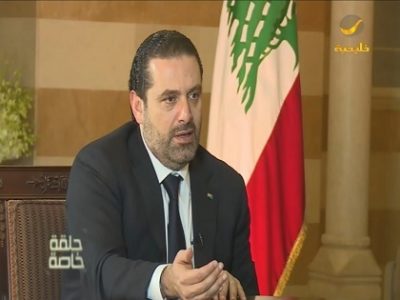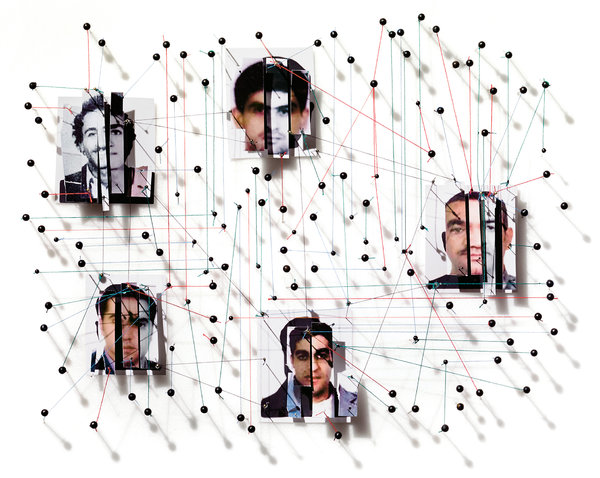
Lebanon’s prime minister resigned abruptly on Saturday, saying that he was stepping down in protest at Iran’s interference in his country and feared he would be assassinated like his father 12 years ago.
Saad al-Hariri announced his resignation from Saudi Arabia and the move appeared to have been done in coordination with Riyadh, which sees Iran as an arch-rival to be countered across the Middle East.
“The evil that Iran spreads in the region will backfire on it,” Mr Hariri said in a televised address. “Despite my efforts, Iran continues to abuse Lebanon.”
He also said his life was in danger and he was believed he was being targeted like his father, former prime minister Rafik al-Hariri, who was killed by a massive car bomb in 2005.
“We are living in a climate similar to the atmosphere that prevailed before the assassination of martyr Rafik al-Hariri. I have sensed what is being plotted covertly to target my life,” he said.
Mr Hariri also lashed out against Hezbollah, the Lebanese militant group which plays a major role in the country’s politics and is strongly supported by Iran.
Hezbollah’s armed wing is considered a terrorist group by the US, UK and most Gulf Arab states and new American sanctions imposed on the group may harm Lebanon’s overall economy. Mr Hariri said the group’s actions had put Lebanon “in the eye of the storm”.
Mr Hariri had been in the role a little over a year and his resignation plunges Lebanon into uncertainty after what had appeared to be a period of progress in the small Middle East state.
In October, the parliament passed its budget since 2005 and last year it successfully elected a president, ending a standoff which had left Lebanon without a head of state for more than two years.
Under Lebanon’s complicated political power sharing system, the role of prime minister must be held by a Sunni, while the president is Christian and the speaker of the house is a Shia.
Michael Aroun, the president, is closely aligned with Hezbollah and Mr Hariri’s resignation may remove one of the few anti-Hezbollah bulwarks inside the Lebanese government.
Mr Hariri announced he was stepping down after a flurry of visits to Saudi Arabia. He travelled to the kingdom earlier this week and met with Thamer al-Sabhan, the Saudi minister for Gulf affairs, who takes a hawkish stance against Iranian influence in the region.
Mr Sabhan called for the “toppling” of Hezbollah and days before Mr Hariri’s resignation he said he expected “astonishing developments”, suggesting he may have had advance warning of the Lebanese politician’s plans.
Mr Hariri quietly returned to Saudi Arabia later in the week and made his resignation speech from there. Minutes after Mr Hariri’s speech, the Saudi minister tweeted what appeared to be a warning to Iran: “Hands of treachery and aggression must be cut off.”
Iran immediately cast Mr Hariri’s resignation as part of a US-Saudi plan for control in the Middle East.
“Al-Hariri’s resignation was done in coordination with Trump and [Saudi Crown Prince] Mohammed bin Salman to foment tension in Lebanon and the region,” Hossein Sheikholeslam, an advisor to Iran’s foreign ministry, told the Fars News agency, which is closely linked to the government.
Saudi Arabia has taken a more aggressive stance against Hezbollah in the last two years, arguing it is an Iranian proxy force that is destabilising the Arab world.
While Hezbollah is fighting in Syria in support of the Assad regime, it also maintains large stockpiles of weapons in southern Lebanon pointed at Israel.
Both Israeli and Lebanese fear that an eventual clash between Hezbollah and the Israeli military is almost inevitable and likely to be bloodier than the 2006 war, which killed over 1,200 Lebanese civilians and 44 Israeli soldiers.
Assassination plot

Al-Arabiya news reported today that : “An attempt to assassinate Hariri was foiled several days ago.”
The two-time prime minister, whose father Rafik was assassinated when he held the same position in 2005, accused Iran and Hezbollah of seeking hegemony in the region.
The 47-year-old Sunni politician’s resignation comes a day after he met at his office in downtown Beirut Ayatollah Ali Khamanei’s senior adviser of international affairs Ali Akbar Velayati.
It also comes comes less than a year after his government was formed.
“Iran has a grip on the fate of the region’s countries… Hezbollah is Iran’s arm not just in Lebanon but in other Arab countries too,” he said.
“In recent years, Hezbollah has used the power of its weapons to impose a fait accompli,” he said, reading a speech from behind a desk.
Hezbollah is a vital ally of Syrian President Bashar al-Assad in the war the Syrian regime is waging against the Islamic State group and armed opposition movements.
It enjoys broad support from Iran and is the only Lebanese party to have kept its weapons after the 1975-1990 civil war.
Its arsenal has since grown exponentially and now outstrips that of the nation’s own armed forces.
It claims it is the only credible rampart against neighboring Israel and its refusal to disarm is the main political crux in Lebanon.
Hezbollah members have been accused over the 2005 assassination in a massive car bomb blast of Rafik Hariri, the dominant figure of Lebanon’s post-war political landscape.
Riyadh is Iran’s main regional rival and the two powers’ tussle for influence has played out in ongoing conflicts in Iraq, Syria and Yemen.
Lebanon in a shock
Lebanese political figures reacted on Saturday to Hariri’s surprise resignation which he blamed on from Saudi Arabia citing Iranian “influence” in Lebanon and the assassination plot that was reportedly foiled few days ago
Hariri had contacted President Michel Aoun and informed him of his decision.
Speaker Nabih Berri has cut short his visit to Egypt to return to Beirut following the Premier’s resignation.
Progressive Socialist Party MP Walid Jumblat took to Twitter and said: “Whatever the difficulties are, sacrifice for the sake of consensus, dialogue and stability is fundamental and our existence is predestined.”
“Lebanon is too small and weak to endure the economic and political repercussions of the resignation,” lamented Jumblat.
Lebanese Forces MP Antoine Zahra said: “We have heard from Saudi authorities about intentions of some to create trouble in Lebanon.”
He expressed hopes the resignation would pave way for solving other political obstacles.
Justice Minister Salim Jreisati a close ally of Hezbollah and Aoun described the move as “confusing and suspicious in terms of time, place and content.”
“Hariri’s resignation is very surprising and I fear that Lebanon has entered the regional conflict,” said MP Ghassan Mokhaiber.
YL with withTelegraph UK

Leave a Reply
You must be logged in to post a comment.